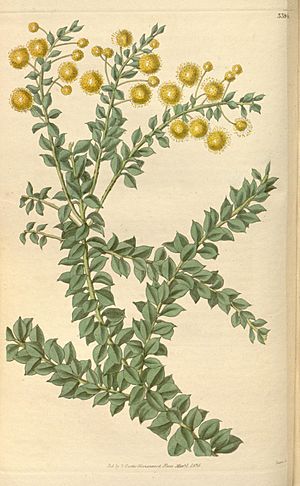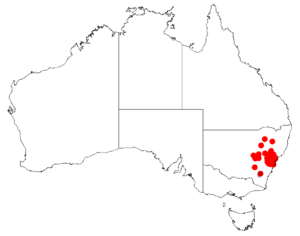Acacia undulifolia facts for kids
Quick facts for kids Acacia undulifolia |
|
|---|---|
 |
|
| Illustration of Acacia undulifolia | |
| Scientific classification | |
| Genus: |
Acacia
|
| Species: |
undulifolia
|
 |
|
| Occurrence data from AVH | |
Acacia undulifolia, also known as the Wavy-leaf Wattle, is a type of shrub. It belongs to the Acacia family, which is a large group of plants. This special wattle only grows naturally in eastern Australia. It's a unique plant found nowhere else in the world!
What Does Acacia undulifolia Look Like?
This shrub usually grows to be about 2 to 3 meters (6.5 to 10 feet) tall. It often has a few main branches that stand up straight or lean a bit. These branches can be curved or straight.
Its smaller branches, called branchlets, are often reddish-brown. Sometimes they can be green. They have ridges and angles, making them not perfectly smooth.
Like most Acacia plants, it doesn't have true leaves. Instead, it has special flattened stems called phyllodes. These phyllodes do the job of leaves. They are green, grey-green, or blue-green in color.
The phyllodes are a bit uneven in shape. They can be flat, or sometimes slightly curved outwards. They are usually shaped like a wide oval. Each phyllode is about 17 to 25 millimeters long and 12 to 16 millimeters wide. They might have a few hairs or be completely smooth.
This wattle blooms between October and November. It produces round flower-heads, like small balls. Each flower-head is about 8 to 9 millimeters across. They contain 20 to 30 pale yellow flowers.
After the flowers, seed pods grow. These pods are somewhat shiny and can be blackish. They are narrow and oblong, meaning they are longer than they are wide. The pods are quite straight, measuring 40 to 80 millimeters long and 16 to 24 millimeters wide.
Why Is It Called Acacia undulifolia?
The second part of its scientific name, undulifolia, gives us a clue about the plant. "Unduli" means wavy, and "folia" means leaf. This name refers to its wavy phyllodes. You can especially notice this wavy edge on the new growth of the plant. This plant looks a lot like another wattle called Acacia piligera.
Where Does It Grow?
The Wavy-leaf Wattle is found only in New South Wales, a state in Australia. It grows in scattered areas across the upper Blue Mountains. You can find it from Mount Monundilla in the north down to the Megalong Valley in the south.
It also grows as far west as the Cox River. To the east, it reaches the Watagan Range and Bucketty. This wattle usually prefers to grow in sandy loam soils that have gravel in them. These soils often come from sandstone rocks.

